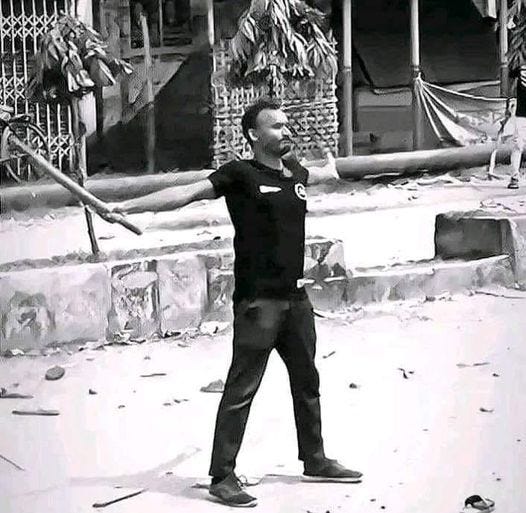Dying for a systemic change
There is a serious governance failure in dealing with the student demands for merit-based recruitment system in Bangladesh’s government jobs. Those of us following South Asia know how quickly public protests get hijacked by political quarters and flare into violence and vandalism. The state has a responsibility to handle the situation with calm and composure, by engaging with the students and not turning against them with political rhetoric that could amount to advocacy of hatred and subsequent hate crime.
Unfortunately, that is exactly what we have seen happening this week. Many parts of the country have been burning and at least ninepeople were killed in the clashes. Abu Sayeed, a 25-year-old student at Begum Rokeya University in Rangpur stretched his arms wide open, standing alone facing the police a few steps away, a gesture that I interpret as nothing but his bravery to confront unlawful actions. Instead of showing restraint, the police fired rubber pellets at him. He fell on the ground shortly and succumbed to death. This incident is shocking and painful. The deaths and violence against students demanding merit-based recruitment in Bangladesh's public service cast a lawless response to peaceful protests.

This could all have been avoided. The existing quota-based recruitment system favoring descendants of freedom fighters has long faced criticism from students. From political bias to false identification, this is a category that is rooted in political class and hierarchy, not equality of people who are citizens of the country. Quotas in job recruitments elsewhere in the world are designed to uphold equity for the marginalized communities.
Currently, a whopping 56 percent of the government jobs are reserved for various quotas. The reserved seats in the government jobs include 30 percent for descendants of freedom fighters, 10 for women, 10 for people in underdeveloped districts, 5 for indigenous communities and one percent for persons with disabilities. Some have argued that the freedom fighters’ quota does not mean that a candidate is not meritorious. That each candidate must first pass the preliminary and written tests and then the eligibility for quota is enforced. What appears deeply dangerous in this recruitment process is how the country is promoting a political class and hierarchy based on an identity that has a history of being forged to reap state benefits.
Bangladesh has a bloodied past and a hard-fought freedom struggle behind its independence and sovereignty. It’s a pride that every Bangladeshi celebrates. The love for a country cannot be proven by a piece of paper. It is an experience that must be cherished by the people.
I am a proud patriot who had an upbringing with all the values that any proud Bangladeshi would have about their country, identity and history. My parents have no proof of their support for the liberation war except for choosing the country they wished to be a part of. They, however, did no less to instill in me the love for my country. Last Sunday, when we were watching the Copa America finals between Argentina and Colombia with our Latin American friends wearing flags and celebrating their country, my son drew the flag of Bangladesh to show support for his country. I do not have a freedom fighter’s credential. Does that make me or my son a lesser Bangladeshi? I can speak with certainty from my experience that many in this country of 170 million will not wait for the state’s validation to show their love for the country.
The recruitment system in Bangladesh’s government services stands as a golden opportunity for many meritorious graduates of the country. It is a matter of job security, a prestige and identity. The government needs to instill the value proposition in these jobs to make them demanding and lucrative. These value propositions must ensure that not only are these jobs hard earned, but they are also a space where the best of the best graduates stand the chance based on their merit, not by some gift of ancestral struggle for liberation of Bangladesh. It is one of those opportunities that the government can use to prevent hundreds of thousands of Bangladeshis from moving to other countries for better opportunities.
An urgent resolution is required in the recruitment process to make the quality of jobs rewarding and accountable, one that is rooted in the principles of equity and equality. This is a policy-oriented issue and must be dealt with full transparency and accountability to meet public interest.
Abu Sayeed’s death cannot be the price students must pay to ask for a systemic change in the recruitment process. There must be independent, thorough and impartial investigation into his killing.
The state must do better to act responsibly than letting a situation get carried away into violence and then responding to it with brute force in the pretext of containing that violence. This is a tactic of the authorities that wish to escape from their responsibility to address a situation with rigour. Calling student protesters “razakars” – traitors of the country – as reports have cited Prime Minister Sheikh Hasina, will do anything but instill love for the country under the given circumstances.
Saad Hammadi is the Policy and Advocacy Manager at the Balsillie School of International Affairs. Follow him on X: @saadhammadi
The article first appeared in The Daily Star.


